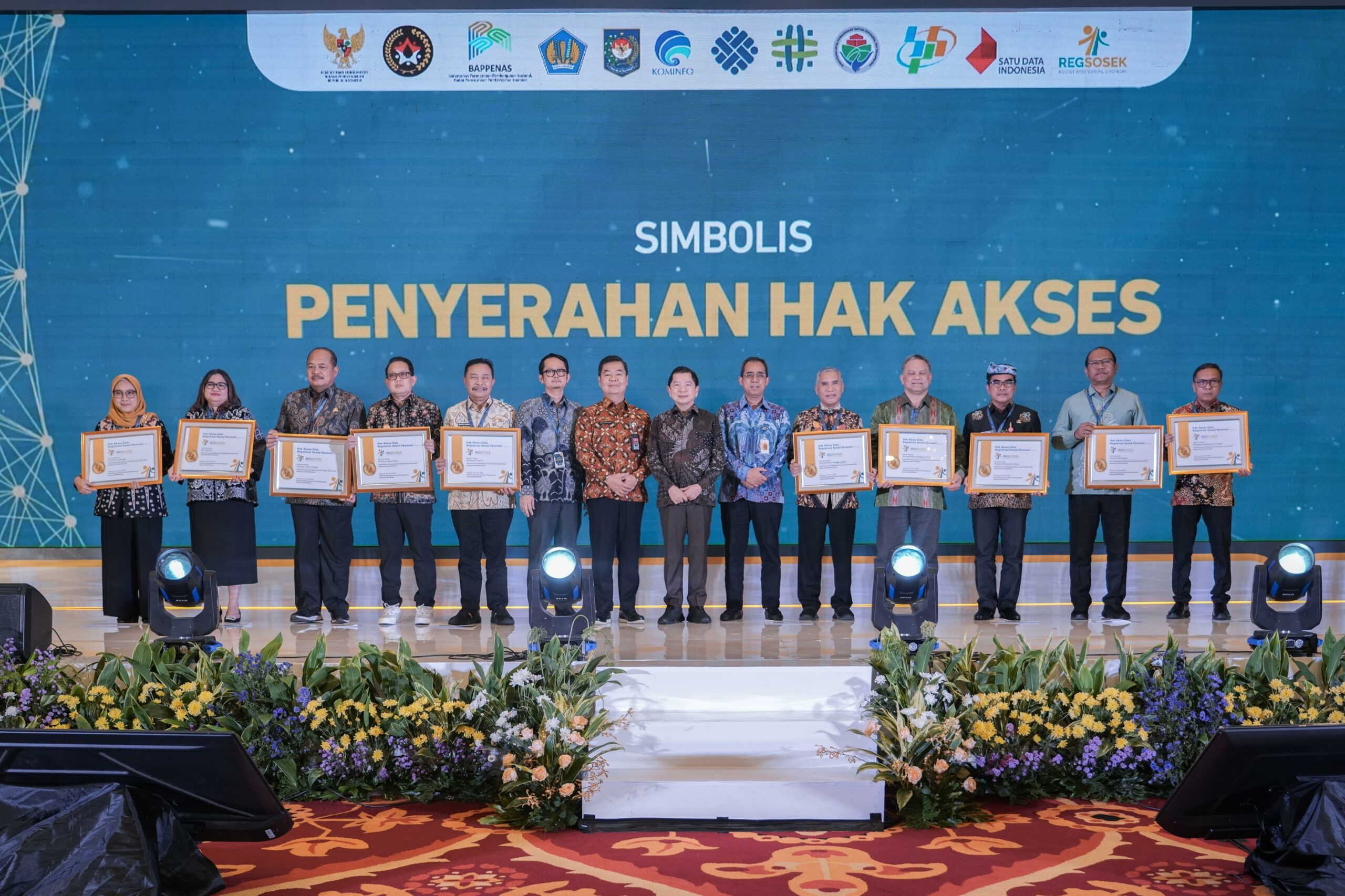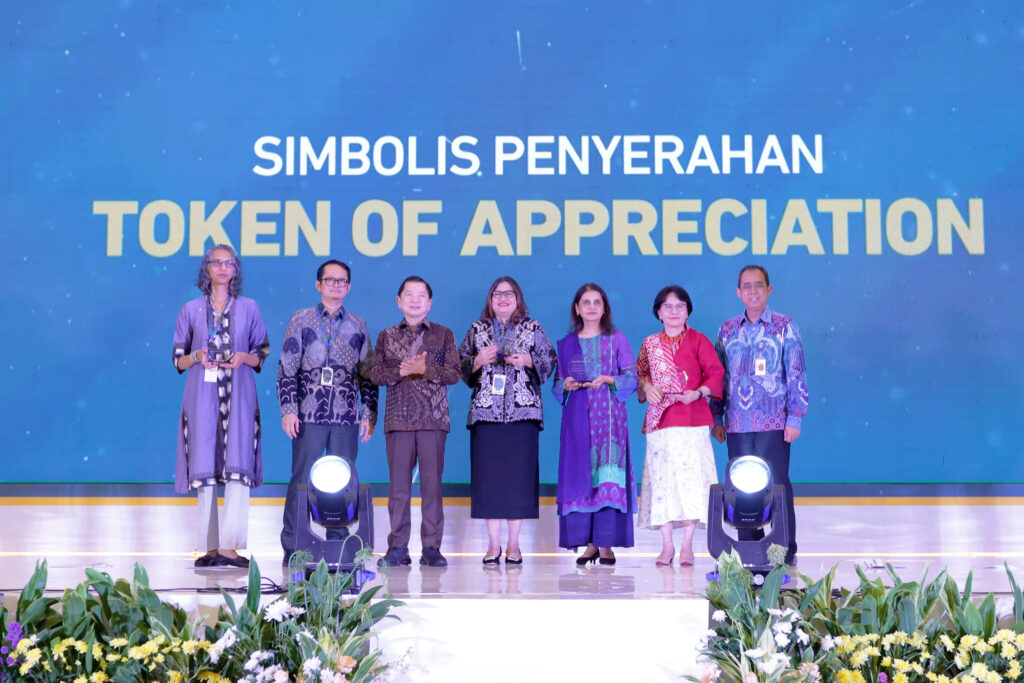Regsosek: One Data for a Golden Indonesia 2045

Suharso Monoarfa, the Minister of National Development Planning/Bappenas, hosted the “Regsosek: Collaborating towards One Data for a Golden Indonesia” event on June 20, 2024. Regsosek, a national socioeconomic registry, supports Indonesia’s One Data initiative by presenting comprehensive microdata on 78 million Indonesian families which can be used for a multitude of purposes in combination with other datasets. Keynote speakers emphasized the utility of this data, as well as the importance of continuously updating Regsosek data through inter-ministerial collaboration. The event, attended by over 780 in-person and almost 22.000 online views from central and subnational governments, academia, development partners, and community organizations, included a symbolic handover of data access rights and a talkshow on practical applications of this registry.
SKALA builds on the Australian Department of Foreign Affairs and Trade’s continued support for data governance in Indonesia and contributes to Regsosek by ensuring its use in enhancing data-driven planning, budgeting, and targeted service delivery. This has been done through comprehensive technical assistance, advisory support, training, and advocacy efforts.
Regsosek’s Relevance and Alignment with Indonesia’s Priorities
Regsosek aligns with Indonesia’s development goals. Minister Monoarfa highlighted that the President of Indonesia has directed the implementation of Regsosek to enhance the social protection system and accelerate the elimination of extreme poverty, both of which are essential for achieving Indonesia’s Vision 2045. Such data is invaluable not only to central and regional government agencies but also to academics and community organizations. It supports the effective implementation of government programs by providing accurate and centralized data. Bappenas assures that data access and utilization adhere to strict personal data protection principles, ensuring compliance with existing regulations.
Data Integration and Collaboration for Scale
Indonesian ministries are keen to integrate Regsosek data to enhance their programs.
- Teguh Setyabudi, Director General of Population and Civil Registration at the Ministry of Home Affairs (MoHA), emphasized MoHA’s support for Regsosek since its inception and noted that collaboration between Bappenas and MoHA has ensured 95.47% of Regsosek data matches MoHA’s population data, thereby enhancing the credibility and usability of both systems. He hopes Regsosek will help achieve Indonesia’s One Data goals by assisting governments in providing more equitable and targeted social assistance.
- Sudarto, State Expenditures Expert at the Ministry of Finance, highlighted the challenge of mistargeting state funds in poverty eradication and stated that the Ministry of Finance and Bappenas will use Regsosek data to identify the right program beneficiaries in relevant ministries, ensuring the effective use of the IDR 496.8 trillion social protection budget.
- Estiarty Haryani, Head of Employment Planning and Development at the Ministry of Manpower, announced that the One Employment Data (SDK) platform, SIAPkerja, is ready to collaborate and share data with Regsosek. Initial experiments show the employment program’s inclusiveness, with significant participation from people with disabilities.
- Siti Azizah, Deputy for Entrepreneurship at the Ministry of Cooperatives and SMEs, stated that integrating Regsosek with the SIDT UMKM would create comprehensive information on the socio-economic conditions of communities and MSMEs throughout Indonesia, facilitating convenience, protection, and empowerment for cooperatives and MSMEs, and urged regional heads to support this integrated data use.
Talkshow: Regsosek Access Rights
In the afternoon, participants returned for a talkshow on how central and regional governments can use Regsosek data. Speakers included representatives from Bappenas, the Ministry of Cooperatives and SMEs, the Ministry of Manpower, and the East Nusa Tenggara’s Head of Bapperida (Regional Development Planning, Research, and Innovation Agency). Bappenas also demonstrated a simulation of the SEPAKAT application, including an introduction to SEPAKAT Edu, a Learning Management System.
An emerging topic from the talkshow was NTT’s quick response, supported by SKALA, in using Regsosek data. Using SEPAKAT, the NTT provincial government analysed service issues faced by the community. Consequently, Bapperida used this analysis to propose action plans at the Musrenbang (Development Planning Deliberation), one of which is aimed at supporting target setting by local service units. Based on these benefits, the NTT Provincial Government plans to build capacity, accelerate access rights and use of Regsosek data at the district/city and village levels.
SKALA’s Comprehensive Support and Collaboration for a Data-Driven Future
SKALA’s support for Regsosek includes developing analytical tools like SEPAKAT, integrating various data sources, and planning for future updates. SKALA has trained over 2,000 participants and 35 Master Trainers across key ministries, as well as 180 trainers across six SKALA partner provinces, to use Regsosek data via SEPAKAT. Advocacy efforts focus on promoting the benefits of Regsosek, encouraging subnational governments to apply for access, and training provincial trainers to disseminate knowledge at the district and city levels. SKALA also facilitates the validation and integration of Regsosek with other data systems, specifically MoHA’s data processing system (SIPD Hub), provides inputs to government planning documents, and will support the design of annual Regsosek updates starting in 2025. The event was organized by Bappenas in collaboration with various ministries and institutions, with support from SKALA. This multi-party collaboration aims to strengthen the commitment of various development actors to realize Indonesia’s One Data vision, crucial for developing well-targeted and inclusive government programs and basic services, contributing to a Golden Indonesia 2045.







